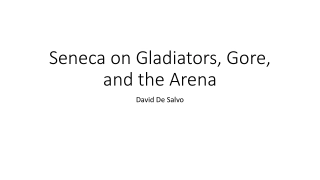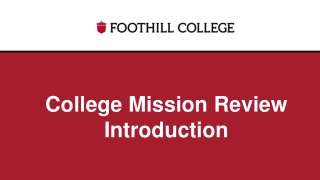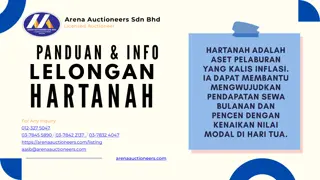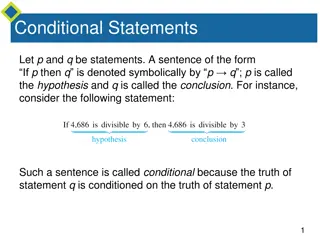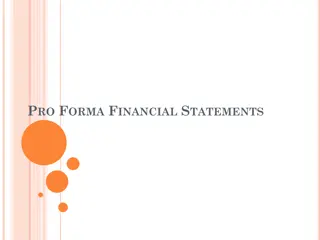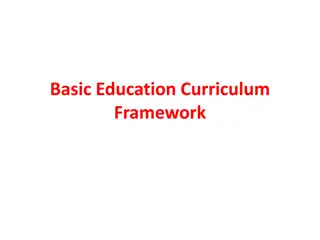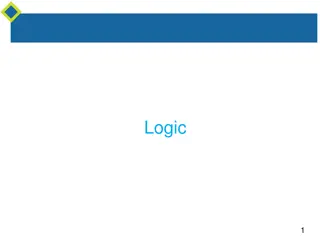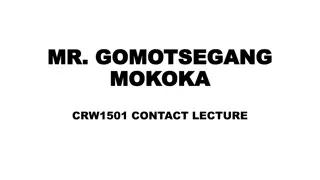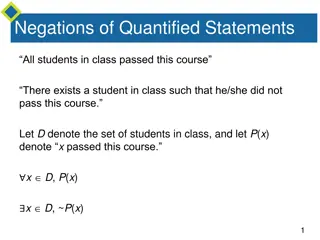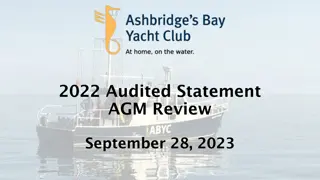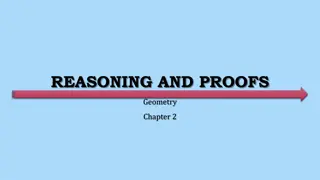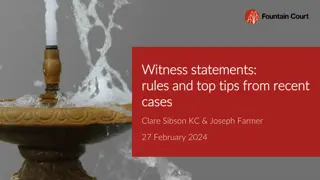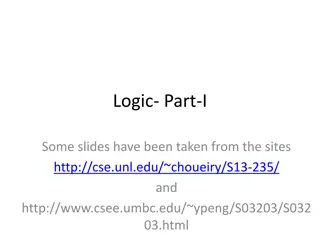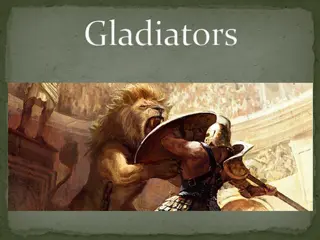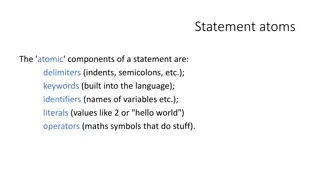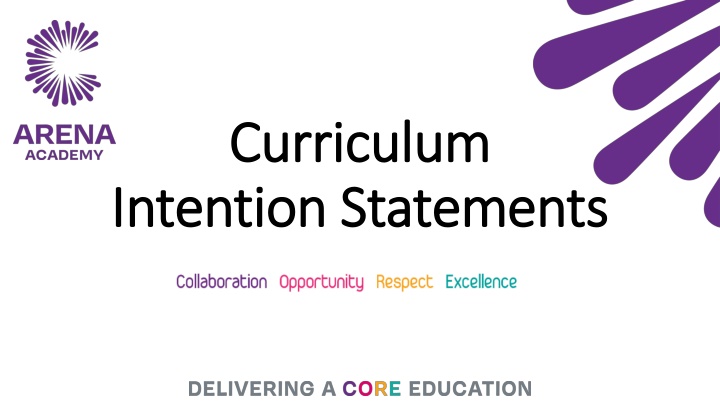
Empowering Student Success Through English, Mathematics, and Science at Arena Academy
"Discover how Arena Academy fosters student success through English, Mathematics, and Science. The English department focuses on nurturing a love for literature and critical thinking skills. Mathematics encourages logical thinking and problem-solving, while Science explores the world through Biology, Chemistry, and Physics. Join us on a journey of academic growth and exploration!"
Download Presentation

Please find below an Image/Link to download the presentation.
The content on the website is provided AS IS for your information and personal use only. It may not be sold, licensed, or shared on other websites without obtaining consent from the author. If you encounter any issues during the download, it is possible that the publisher has removed the file from their server.
You are allowed to download the files provided on this website for personal or commercial use, subject to the condition that they are used lawfully. All files are the property of their respective owners.
The content on the website is provided AS IS for your information and personal use only. It may not be sold, licensed, or shared on other websites without obtaining consent from the author.
E N D
Presentation Transcript
Curriculum Curriculum Intention Statements Intention Statements
Subjects History Design Technology Performing Arts Drama Music Psychology Health & Social Care Photography Sociology GCSE PE Sports Studies Personal Development English Mathematics Science: Biology, Chemistry & Physics Art Business Studies Computer Science Digital IT Food Science Religious Education French Spanish Geography
English At Arena Academy, the English Department has an irrevocable belief that every student can, and will, succeed. We work hard to impart the importance of English skills with the aim of embedding, not only a thirst for success and a love of our subject, but the importance of the skills they develop as facilitating to their post-16 and lifelong choices. The high expectations we have of all our students demonstrates our dedication to their success and, as an innovative department, we are reflective and supportive in our own practices to foster an environment conducive to collaboration and improvement. In English, students will discover the human experience through studying a variety of non-fiction and fiction texts. We will ignite a sense of awe and wonder by learning about those who have and continue to inspire us; learning about their place, identity and experiences. We pride ourselves in fostering inclusive learning environments where contentious and sensitive issues can be explored freely, enabling students to not only be more culturally aware, but, importantly, self-aware too. Our determination to develop conceptual knowledge of our curriculum allows students to gain a clear understanding of how English was, how English is today and to consider what English will become in the future. This development of knowledge with the embedding of key skills required for this subject will allow students to gain autonomy in critical reading and a passion and flair for the creativity of the written and spoken form. Ultimately, our ethos is to nurture the growth of our students; developing their verbal, cognitive and written skillset, whilst instilling within them a passion for literature that will remain for years to come.
Mathematics At Arena we have a desire for students to foster a love of Mathematics as they become confident individuals to deal with all aspects of mathematics and numerical challenges in their chosen careers and adult life. Our purpose is to allow students to gain a clear and deeper understanding of mathematics in todays society and consider the importance of mathematics in the wider world and their own future. It is vital that students have a readiness for their next steps in life and are confident to think logically and problem solve through their own learning in mathematics. Students are encouraged to collaborate with their peers to problem solve, build resilience and promote independence all while applying key concepts and skills in mathematics.
Science At Arena we aim to develop an understanding of the world around us through Biology, Chemistry and Physics and its connection to our shared prosperity. To motivate our children to see the value of an inquisitive mind using the nature, application, and implication of scientific process. Finally, to embed a culture of aspiration to unlock the doors to success.
Business Studies The GCSE Business curriculum at Arena Academy is thoughtfully designed to provide students with a comprehensive understanding of foundational business concepts. Our approach is centered on cultivating critical thinking, nurturing an entrepreneurial mindset, and bridging theoretical knowledge with practical applications. Emphasizing ethical considerations, effective communication, and proficient problem- solving skills, our curriculum equips students for both academic pursuits and future professional endeavor. Assessment methodologies are transparent and supportive, aligned with our commitment to individualized student growth. Our overarching goal is to develop confident, knowledgeable, and ethically aware contributors to the global business community. Positioned as a preparatory platform for advanced studies and successful careers, our program aims to impart the skills necessary for success in an ever-evolving business landscape. At Arena, we take pride in our role in molding capable, innovative, and socially responsible future business leaders.
Computer Science The Computer Science curriculum here at Arena Academy is designed with the explicit intention of nurturing computational thinking, thereby endowing students with advanced proficiency in logical reasoning, algorithmic acumen, and the principles of abstraction. Our mission is to craft individuals into digital experts, emphasizing the pivotal role of computer science education as the gateway to unlocking profound digital literacy. This educational program guides students not merely in navigation but in the mastery of the ever-evolving digital terrain, underscored by critical acumen and responsible expertise. Beyond mere coding, our students are envisioned as ethical architects who play a vital role in shaping the future. The curriculum is strategically structured to instill a deep sense of responsibility, accentuating ethical computing practices, digital ethics, and a heightened consciousness regarding the societal implications of their digital creations. The curriculum is designed to prepare students not only with technical skills but also with a mindset that aligns with the demands of the contemporary world.
Digital IT Arena Academy's vision for Digital Information Technology (DIT) is centered on providing learners with a robust foundation of technical knowledge and skills in vocational contexts throughout Key Stage 4. The DIT award emphasizes data management, interpretation, presentation, and protection, complementing traditional GCSEs and expanding learners' understanding of diverse progression options. Through our curriculum, we strive to cultivate students' digital thinking and creativity, empowering them to break down complex problems and devise efficient solutions. We are dedicated to instilling a deep understanding of computational theory and emerging technologies while offering hands-on experience in practical programming to bring their ideas to fruition. As a result, our students graduate as digitally literate individuals well- prepared to navigate and excel in an ever-evolving technological landscape. The overarching curriculum intent is to furnish students with transferable skills essential for success in our technologically driven world.
Food Studies (Preparation & Nutrition) In Key stage 3, students are encouraged to follow the eatwell guide and to understand the benefits of healthy eating. Students will develop their practical skills using a range of different methods to prepare, cook and serve food. Our curriculum is designed to help prepare students for the wider world on leaving school, to be able to cater for themselves and their families. Additionally, students will be encouraged to choose sustainable ingredients and to understand the importance of food provenance and the impact of food production on the environment. In Key stage 4, students will build on this grounding to develop a secure knowledge of the function and properties of ingredients and the associated nutritional value of food . They will demonstrate their knowledge through completion of two assignments, including written and practical challenges. The course culminates with opportunity to create a range of dishes within a practical exam, and a written exam paper to test knowledge and understanding.
Religious Education To provide thought provoking and challenging questions about the meaning and purpose of life, issues of right and wrong and life in the modern world. Students are also equipped with the skills to respond to local and national issues with balance and expertise.
MFL: French & Spanish Foreign languages have a vital and indispensable role to play in the provision of a broad and balanced curriculum. Igniting students curiosity and love of other cultures and equipping them with the tools to express their own ideas in another language is a precious opportunity, to be highly valued by all. The MFL curriculum at Arena Academy is intended to open doors and open minds by encouraging students to discover and develop an appreciation of other languages and cultures whilst deepening their understanding of their own. The curriculum provides a solid basis for students to learn a love of and curiosity for foreign languages, developing both the breadth and depth of their knowledge which will enable them to both understand and communicate effectively with someone from a different linguistic background. Currently, there is a huge demand for suitably qualified linguists, as clearly stated in the British Council s recent report Languages For The Future: All should recognise that the UK s language deficit remains a threat to our overall international competitiveness, influence and standing in the world, as well as to our citizens ability to play a meaningful role in the global economy in an increasingly networked world . Enabling students to thrive and succeed in a truly globalised world, therefore, remains one of the key contributions of foreign languages to the school curriculum.
Geography In Geography, students will gain a coherent understanding of the human and physical geography of the world. As students begin to understand our role as global citizens in an interconnected world, we will seek to inspire their curiosity and develop their knowledge further whilst learning about Britain s historical Geography and the wider world. Geography at Our Arena seeks to develop their geographical knowledge through local studies of Birmingham and the rest of the UK, to in depth studies of China, Africa and the Middle East with specific case study examples within each section. Geography at Our Arena also develops key skills in our students including hands-on fieldwork skills as well as increasing our students graphical and numerical skills through data presentation. We are proud to say that Geography at Arena will address misconceptions and challenge stereotypes, promoting vital character development through empathetic investigations of key country enquiries.
History The curriculum in History at Arena Academy is designed to be broad, covering a range of periods, as well as engaging and intellectually stimulating. It has been designed to be ambitious whilst still meeting the needs of all students. In History we aim to develop future historians, developing their skills for future learning and enjoyment. As a department, we aim to provide students with opportunities of core knowledge which ensure students remember the content in the long-term, as well as integrating broader, hinterland knowledge, ensuring progress and successful outcomes for all. The curriculum is designed to instill confidence in students to debate and discuss their knowledge, feedback in a way that is progressive, as well as nurture the disciplinary knowledge required in History, all whilst fostering a passion for the subject. Elements of our curriculum have been tailored to our students to ensure that their own culture, traditions and history is covered, allowing others to learn and develop their own understanding of the world around them. It is also designed to introduce students to experiences they might not have available to them such as trips to historically relevant sites. Ultimately within the History department we aim to help students become confident learners and developed young adults who are prepared to lead, make informed decisions and communicate effectively. Our History students will be able to reflect and adapt and become critical independent thinkers.
Design Technology Design and Technology (D&T) is an inspiring, rigorous and practical subject which prepares all young people to live and work in the designed and made world. Cultural capital and British values are explored across the key stages by appreciation of the work of others locally, nationally and occasionally internationally, each subject SOW identifies and relates to real contextual challenges focusing upon ethics, people, communities or businesses. Design and Technology builds on the skills and knowledge pupils have already learnt at primary school together with base line testing and transition work staff are well informed of the pupils starting point as they commence KS3. The DT curriculum is collaboratively and coherently planned and sequenced across Years 7-9 to ensure that pupils build on all aspects of prior learning that stretches and challenges regardless of starting point. Retrieval and repetition are features of pupils learning and understanding as each annual rotation builds upon prior knowledge and expertise as we develop the 4 areas of mastery namely: designing, making, evaluating and technical knowledge. The design technology curriculum covers all aspects of the national curriculum. Design Technology progression builds upon procedural knowledge and skills therefore offering year on year incremental challenge. As pupils progress through Key Stage 3, they are given the opportunity to focus on specific areas of the subject such as Product Design, Food Technology, Electronics & Systems, Textiles and Graphics. Pupils follow a rotation of work in 4 subject disciplines each year from years 7 to 9 looking at different contextual challenges. Pupils work in mixed ability groups in years 7 - 9. All teachers are aware of any disadvantaged pupils on the DT department tracking sheets and class lists on Aspire 5 and pupil premium, all teachers are reminded of their responsibility to ensure that any obstacles to learning are removed. The department supports the needs of all pupils regardless of any potential barriers as we believe in success for all and are wholly inclusive. The GCSE is split into 50/50 coursework and exam. Our curriculum offer is routinely reviewed and updated to ensure we remain current and ambitious to all pupils. Reading is promoted in each classroom with an area devoted to subject specific learning. Reading features in all units of work as topical themed news articles raising the profile of the subject whilst developing thinking skills. The DT curriculum reflects the local (Birmingham) context by addressing potential gaps in pupils knowledge and skills, thereby ensuring they can contribute to requirements at local businesses such as JCB & Jaguar - Land Rover(JLR). We have high academic/ vocational/ technical ambition for all pupils.
Performing Arts (KS4 Drama & Music) The Performing Arts Faculty seeks to develop creative, confident and collaborative individuals who strive to achieve excellence through the realisation of their expressive talents. In KS3, Performing Arts are designed to boost students confidence and communication skills and help them to develop transferrable skills that are relevant to all, such as personal and social awareness. Performing Arts develops students imagination and creative thinking skills through play, imagination, and feelings, whilst also helping students to understand each other and make sense of the world.
Music (KS3) The music curriculum aims to empower students to explore, create and appreciate a range of musical styles and genres. It is designed to encourage students to express their ideas and emotions through music composition and performance, fostering innovation and originality. Through our music curriculum, we support students to enhance their performance skills.; our aim is to cultivate technical proficiency and confidence in various musical instruments and vocal techniques through individual and group performances. This fosters collaboration, promotes teamwork and communication through ensemble participation, highlighting the importance of working together to create harmonious music. Through collaborative learning, we encourage the exploration of cultural diversity through the study of traditional music, which encourages appreciation and respect for global musical heritages. The curriculum allows our students to recognise the power of music as a tool for emotional expression and personal reflection, providing students with an outlet for their feelings. It also focuses on instilling a passion for music that motivates students to pursue musical interests beyond the classroom, whether through performance, composition, or active listening. By implementing this curriculum, we aim to create an inclusive and dynamic musical environment that celebrates creativity, collaboration, and cultural understanding, preparing students to be informed and engaged citizens in a diverse world. Music is the soundtrack of life. Music is the tool to express life. Music is life itself. Louis Armstrong
Psychology Psychology explores how behaviour can be explained, the most appropriate methods for investigating behaviour and implications of findings for the real world. The intent for the Psychology curriculum is to equip students with the necessary scientific knowledge, skills and vocabulary to develop a better understanding of themselves and the wider world. The Psychology curriculum will enable students to value the importance of psychological research, will promote a curiosity of the human mind and body and make students aware of the implications this has on Human Behaviour in our society.
Health and Social Care The Health and Social Care department will nurture every student through their journey to develop their resilience, compassion, and independence, growing into well-rounded individuals to succeed in today s diverse society. Complimenting other subjects and the wider school, students will experience and study a vast range of Health and Social Care topic areas requiring them to demonstrate maturity and respect for others, coupled with high expectations, which will encourage students to aspire to excellence. Students will become confident and fully prepared to manage their emotions for the many challenges and opportunities they face for their health and wellbeing, preparing them for life and inspiring them to work within the industry. Real life links: About 3 million people, in the UK, work in health and social care - equivalent to 1 in every 10 people. Demand for both health and social care is likely to continue to rise due to the ageing population, so it will continue to play a key role in UK society. The demand for people to fill these vital jobs will continue to increase. This qualification will ensure that each student has the opportunity to understand the wide range of vocational opportunities and entry routes in Health and Social Care, and to challenge stereotypes such as entry routes and gender roles. This course could lead to a long term career within the sector. According to Kings Fund (2020) the health care workforce includes 48% of whom are highly educated with professional qualifications.
Photography The Photography curriculum aims to develop practical image taking skills (we think of this as drawing with light) alongside an ability to interpret, frame and edit images to create work with deeper meanings. .. The curriculum is designed to develop a solid foundation of image taking and key concepts such as the exposure triangle and later to apply these skills to create personal photography outcomes. We utilize a diverse range of editing processes, digital and physical, to encourage student expression using visual language. Our curriculum is designed for students to explore concepts and critical sources of their own choosing to ensure students are engaged, motivated and have ownership of their creative practice. The curriculum includes a range of critical references from historical to contemporary as well as alternative sources of ideas such as literature and media. Ultimately, we aim to develop students who see more than just an image and can thoughtfully analyse images. In turn, students will be equipped to capture more than just an image and to thoughtfully create meaning in their own work. We aim to instill a life-long engagement with looking, seeing and expression through image taking. Great photography is about depth of feeling, not depth of field. Peter Adams
Sociology The premise of GCSE Sociology is to develop the students sociologicalimagination and for them to understand the social world and our behaviour in it so that they will be able to have a rich understanding of the context of their lives, communities and their futures. Sociology aims to give our students the opportunity and skills to think critically about the structures within society, both in the UK and globally, including their impact on various social groups. Our intent is to challenge students pre-existing beliefs and assumptions, helping them to explain social trends and develop their understanding of the personal identities of themselves and others.
GCSE Physical Education The GCSE Physical Education (AQA) option at Arena Academy intends to offer students the opportunity to explore PE within both the practical element (40%) and the theory elements of Physical Education (60%). The aim is to give students an insight into health and fitness, the factors affecting sporting performance and the social and cultural factors affecting participation through sport and PE. The course will allow students to reflect upon their strengths and developments within sports they are interested in and provide an opportunity to link theory to their own personal sporting interests. Theoretical topics that students will study include: Anatomy and Physiology, Movement Analysis, Physical Training, Sport Psychology, Socio- cultural Issues, Health, Fitness and Well-being and using Data These topics will expand the knowledge that students have surrounding sports and fitness and develop a greater understanding of the science linked to physical education. The range of sports for assessment at GCSE level such as netball, trampolining, handball, football and athletics will look to further develop students practical skills and performance to a competitive level. This is in the hope that they develop a greater love for a variety of sport and progress their fitness levels for life-long participation in physical activities.
Sports Studies Cambridge National Sport Studies at Arena Academy will encourage students to delve further into their own skills within specific sports and focus on the application of these to real life practical sport situations. Students will develop their leadership and enhance their abilities to evaluate the skills required. They will study topics affecting sport through the contemporary issues unit, both play and lead sporting activities, as well as having the chance to explore sport in the media.
Personal Development Through Personal Development we aim to help our students foster lifelong aspirations, goals and values and to give every child and young person an equal opportunity to develop the skills and knowledge they need to thrive now and in the future. This includes helping them to deal with critical issues they face every day such as friendships, emotional wellbeing and change. And giving them a solid foundation for whatever challenging opportunities lie ahead, so they can face a world full of uncertainty with hope. From making informed decisions about alcohol to succeeding in their first job, Personal Development Education helps pupils prepare for all the opportunities, challenges, life decisions and responsibilities they'll face. This in turn achieves a 'virtuous circle', whereby pupils with better health and wellbeing can achieve better academically, and enjoy greater success.


